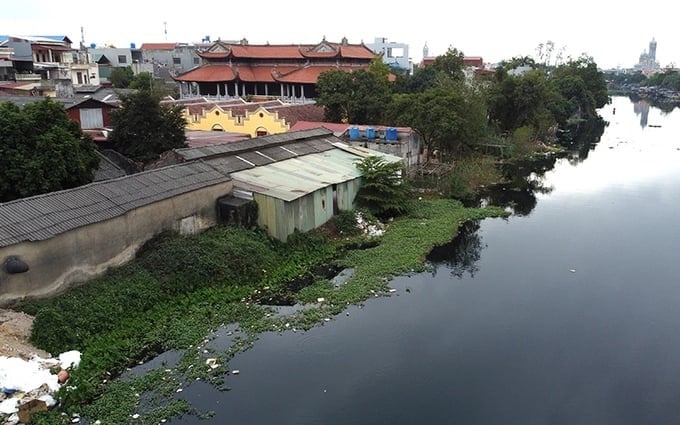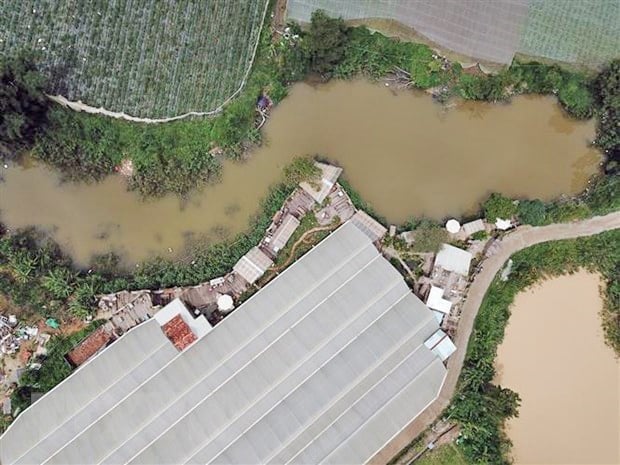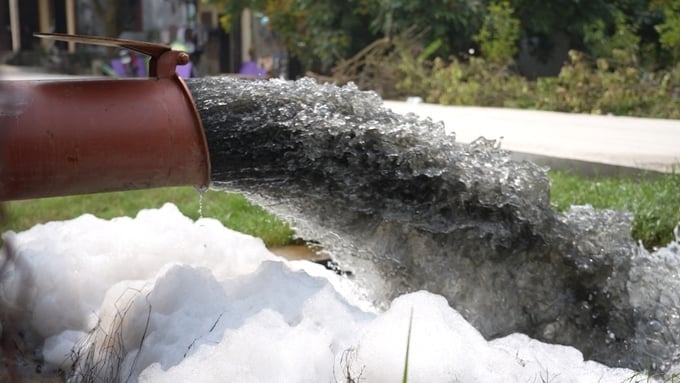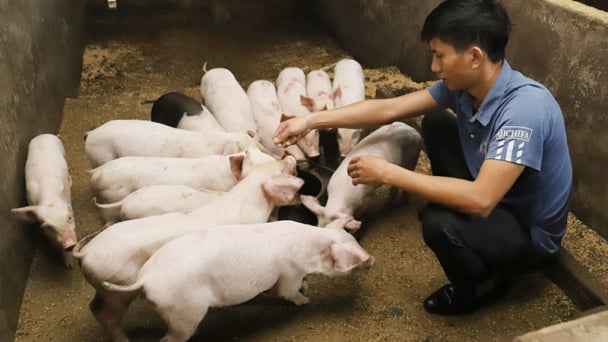June 20, 2025 | 02:39 GMT +7
June 20, 2025 | 02:39 GMT +7
Hotline: 0913.378.918
June 20, 2025 | 02:39 GMT +7
Hotline: 0913.378.918
The Ministry of Agriculture and Rural Development (MARD) has just sent Document No. 2271/BNN-TL to the People's Committees of provinces and municipal cities, requesting to strengthen the handling of violations of the protection scope of irrigation works.
In the above-mentioned document, MARD said that according to data reported by the provinces, from 2018 to the end of 2023, 62,299 cases of violation of the protection scope of irrigation works were detected, of which the number of arising cases in 2023 decreased compared to 2022 (4,248/5,388 cases) and the number of handled cases increased compared to 2022 (2,163/1,212 cases).

The section of the Kim Son irrigation canal passing through Sat town, Binh Giang district (Hai Duong) was encroached, affecting the flow of the system. Photo: Vu Sinh.
However, violations of the protection scope of irrigation works relate to many fields such as land, construction, and environment, including: building solid houses, temporary houses, factories, treasures, tents, and livestock barns; building walls and loading and unloading wharves and yards; gathering raw materials, materials, supplies, and facilities; digging ponds for aquaculture; and exploiting construction materials. The violations still have a lot of problems and have not been thoroughly resolved.
MARD requests the People's Committees of provinces and cities to strengthen the direction of the implementation of solutions to effectively handle violations of the safety protection of irrigation works and mark the protection scope of irrigation works. This aims to enhance the effectiveness and efficiency of state management and law enforcement in managing and handling violations of the protection scope of irrigation works, ensuring water quality for agricultural production, and ensuring the safety of irrigation works, especially during the 2024 rainy season.
Regarding handling violations of the protection scope of irrigation works, MARD proposes continuing to organize statistics and classify violations of the protection scope of irrigation works. In particular, clarify the nature, extent, causes, and handling directions, and recommend competent authorities consider and decide on handling.
Besides, the People's Committees of provinces and cities need to direct the Department of Agriculture and Rural Development to chair and coordinate with relevant departments and branches to develop and submit to the Provincial People's Committee a regulation on coordination and handling of violations of irrigation works in the area. In particular, the content of the handling process and the handling responsibilities of departments, branches, People's Committees at all levels, and units exploiting irrigation works are specified as follows:

Many construction projects cause the area of P'róh Lake, Don Duong district, Lam Dong province to increasingly shrink. Photo: Quoc Hung.
Regarding the placement of landmarks for the protection scope of irrigation works, MARD requests the People's Committees of provinces and cities to direct the organization of the exploitation of irrigation works in the construction area and submit to the Provincial People's Committee a plan to place boundary markers for irrigation works for approval (priority is given to works that are at risk of violations of encroaching or occupying the protection scope);
Chair and coordinate with the district-level People's Committee and commune-level People's Committee where the work is located to publicly announce the work safety protection corridor landmark; set up the landmark on the ground; and hand over the landmark to the commune-level People's Committee where the work is located for management and exploitation according to the provisions of Clause 2, Article 43 of the Irrigation Law; Clause 2 and Clause 3, Article 56 of the Decree No. 43/2014/ND-CP dated May 15, 2014 of the Government detailing a number of articles and clauses of the Land Law; Circular No. 05/2018/TT-BNNPTNT of the Ministry of Agriculture and Rural Development dated May 15, 2018 detailing a number of articles of the Law on Irrigation that have been amended and supplemented in Circular No. 03/2022/TT-BNNPTNT June 16, 2022.
Regarding organizing the exploitation of irrigation works, chair and coordinate with the commune-level People's Committee and the Department of Natural Resources and Environment where the work is located to review the current status of land use within the work safety protection corridor scope and to propose competent state agencies to resolve according to the provisions of Article 48 of the Irrigation Law; Clause 4, Article 56 of Decree No. 43/2014/ND-CP.
Regarding handling the risk of water pollution in irrigation works, MARD said that currently, water pollution in some irrigation work systems is occurring at different levels. To overcome the above situation, the Ministry requests the Provincial People's Committee to direct relevant departments and branches to implement solutions and organize the collection and treatment of domestic wastewater from urban areas and concentrated residential areas; wastewater from craft villages and livestock facilities in the province according to the provisions of Articles 56, 57, and 86 of the Law on Environmental Protection, Decree No. 08/2022/ND-CP; and Decree No. 80/2014/ND-CP, which has been amended and supplemented by Decree No. 98/2019/ND-CP.

Polluted water is pumped directly from the Bac Hung Hai river to irrigate fields in Dong Than commune, Yen My district, and Hung Yen province. Photo: Hung Khang.
Review and evaluate the irrigation work’s ability to receive wastewater. In cases where the irrigation work can no longer bear the load, the license will not be issued according to the provisions of Clause 2, Article 7 of the Law on Environmental Protection. Strengthen inspection to detect, fight, and handle violations that cause water quality pollution in irrigation works.
At the same time, strengthen information and communication work to raise awareness and responsibility among people and relevant agencies and organizations in protecting the environment and water quality in irrigation works, using water economically and effectively, and well managing waste discharge and collection within the protected scope of irrigation works.
Translated by Huyen Vu Thu

(VAN) Biodiversity is being threatened by traditional remedies made from wildlife. Traditional medicine and humans must change to live in harmony with nature.

(VAN) Agrifood investment and finance solutions for people and the planet.

(VAN) Microplastic contamination has become pervasive in seafood, posing unprecedented challenges for food safety and marine ecosystems.

(VAN) Proactively using vaccines, combined with transport control and enhanced surveillance, is the only viable path toward biosecure and sustainable livestock production in Vietnam.

(VAN) Located in the southeast of Ho Chi Minh City, the Can Gio Mangrove Biosphere Reserve is considered the ‘green lung,’ a solid shield protecting the city.

(VAN) To address plastic pollution, closing the plastic recycling cycle will bring significant economic and environmental benefits.

(VAN) According to the Binh Thuan Department of Industry and Trade, in the first five months of 2025, Binh Thuan's dragon fruit export turnover increased by 20.65% compared to the same period last year.